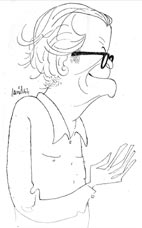4.1.1.9.1 Continuation of the poetic work of Manuel Navarro Luna (1894 – 1966)

With the publication of the poetry collection “Pulso y Onda” in 1932, Manuel Navarro Luna’s poetry embodied all the ethical and aesthetic elements associated with so-called social poetry. This is realized insofar as the expansive and conflictive “I,” characteristic of modernism but of Romantic ancestry, becomes a mirror of great human conflicts, with the guiding meaning imprinted on it by the ideology of socialism.
Navarro Luna’s lyrics sometimes become epic songs, filled with stark, impressionistic images, focused on situations within his social context, with a heightened sense of responsibility as man and as the poet to the world, and implicitly, of poetry not as a mere reflection but as a transformative entity through denunciation; and this perhaps gives rise to his emphatic tone, his need to anchor the reader, to provoke.
Another point of rupture with avant-garde—which for the author was perhaps only a bridge to subversion but not a path to the poetic stage—is his return to the natural environment, not only as landscape but also as human life, to the detriment of the urban environment as noise and artifice.
In addition to this book, during the Republican era, he published the collection of poems “La tierra herida” (The Wounded Land), in which he continued to explore the peasant theme, a legacy of criollismo (criollism), but with a perspective devoid of the picturesque detail of the nineteenth century. He reiterates the symbolism of the earth as a matrix of life and a welcomer of death; and of the existence of peasants, intimately associated with nature from an ontological perspective.
Navarro Luna—sometimes under the pseudonym Mongo Paneque—published his texts in numerous magazines and newspapers; in addition to those already mentioned in another section from his quasi-native Manzanillo, these include “La Defensa,” “La Montaña,” “Letras,” “Revista de Avance,” “Social,” “Renacimiento,” “Hoy,” “Bohemia,” “Verde Olivo,” “La Gaceta de Cuba,” and “Unión.”
His political career and creative work would definitively take a revolutionary course, especially because he sided with the peasants and the humble, based on a true spiritual identification and not solely on ethical and scientific reasoning. In this sense, Pablo Armando Fernández transcribes these verses from the poet who was dreaming or dreaming while walking:
“Why are we children / of the Sierra Maestra / and of the Cauto?”
The mountain gave us its tremendous heart:
Brave root of excellence and infinity…!
We have no blood but the burning blood
which is a flame in the arteries, always on fire, of the river…!”
He also states about the poet:
“We are not here to repeat the excellence of his ardor, which became words, words animated by the action of creative purity. We are here to remember a life lesson, an example of lordly manliness, a tenderness that permeated his eyes and lips, always laboring; a gesture that prompted one to feel the depths of truth in a truthful mouth, incapable of violating reason, much less the dream that is all poetry.”








